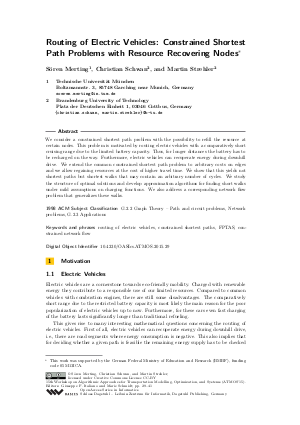Routing of Electric Vehicles: Constrained Shortest Path Problems with Resource Recovering Nodes
Authors Sören Merting, Christian Schwan, Martin Strehler
-
Part of:
Volume:
15th Workshop on Algorithmic Approaches for Transportation Modelling, Optimization, and Systems (ATMOS 2015)
Part of: Series: Open Access Series in Informatics (OASIcs)
Part of: Conference: Symposium on Algorithmic Approaches for Transportation Modelling, Optimization, and Systems (ATMOS) - License:
 Creative Commons Attribution 3.0 Unported license
Creative Commons Attribution 3.0 Unported license
- Publication Date: 2015-09-14
File

PDF
OASIcs.ATMOS.2015.29.pdf
- Filesize: 0.49 MB
- 13 pages
Document Identifiers
Subject Classification
Keywords
- routing of electric vehicles
- constrained shortest paths
- FPTAS
- con- strained network flow
Metrics
- Access Statistics
-
Total Accesses (updated on a weekly basis)
0PDF Downloads0Metadata Views
Abstract
We consider a constrained shortest path problem with the possibility to refill the resource at certain nodes. This problem is motivated by routing electric vehicles with a comparatively short cruising range due to the limited battery capacity. Thus, for longer distances the battery has to be recharged on the way. Furthermore, electric vehicles can recuperate energy during downhill drive. We extend the common constrained shortest path problem to arbitrary costs on edges and we allow regaining resources at the cost of higher travel time. We show that this yields not shortest paths but shortest walks that may contain an arbitrary number of cycles. We study the structure of optimal solutions and develop approximation algorithms for finding short walks under mild assumptions on charging functions. We also address a corresponding network flow problem that generalizes these walks.
Cite As Get BibTex
Sören Merting, Christian Schwan, and Martin Strehler. Routing of Electric Vehicles: Constrained Shortest Path Problems with Resource Recovering Nodes. In 15th Workshop on Algorithmic Approaches for Transportation Modelling, Optimization, and Systems (ATMOS 2015). Open Access Series in Informatics (OASIcs), Volume 48, pp. 29-41, Schloss Dagstuhl – Leibniz-Zentrum für Informatik (2015)
https://doi.org/10.4230/OASIcs.ATMOS.2015.29
BibTex
@InProceedings{merting_et_al:OASIcs.ATMOS.2015.29,
author = {Merting, S\"{o}ren and Schwan, Christian and Strehler, Martin},
title = {{Routing of Electric Vehicles: Constrained Shortest Path Problems with Resource Recovering Nodes}},
booktitle = {15th Workshop on Algorithmic Approaches for Transportation Modelling, Optimization, and Systems (ATMOS 2015)},
pages = {29--41},
series = {Open Access Series in Informatics (OASIcs)},
ISBN = {978-3-939897-99-6},
ISSN = {2190-6807},
year = {2015},
volume = {48},
editor = {Italiano, Giuseppe F. and Schmidt, Marie},
publisher = {Schloss Dagstuhl -- Leibniz-Zentrum f{\"u}r Informatik},
address = {Dagstuhl, Germany},
URL = {https://drops.dagstuhl.de/entities/document/10.4230/OASIcs.ATMOS.2015.29},
URN = {urn:nbn:de:0030-drops-54559},
doi = {10.4230/OASIcs.ATMOS.2015.29},
annote = {Keywords: routing of electric vehicles, constrained shortest paths, FPTAS, con- strained network flow}
}
Author Details
References
-
Georg Baier. Flows with Path Restrictions. PhD thesis, TU Berlin, 2003.

-
Georg Baier, Thomas Erlebach, Alexander Hall, Ekkehard Köhler, Heiko Schilling, and Martin Skutella. Length-bounded cuts and flows. In Automata, Languages and Programming, LNCS 4051, pages 679-690. Springer Berlin Heidelberg, 2006.

-
Moritz Baum, Julian Dibbelt, Lorenz Hübschle-Schneider, Thomas Pajor, and Dorothea Wagner. Speed-consumption tradeoff for electric vehicle route planning. In Proceedings of the 14th Workshop on Algorithmic Approaches for Transportation Modeling, Optimization, and Systems (ATMOS’14), OpenAccess Series in Informatics (OASIcs), pages 138-151, 2014.

-
Moritz Baum, Julian Dibbelt, Thomas Pajor, and Dorothea Wagner. Energy-optimal routes for electric vehicles. In Proceedings of the 21st ACM SIGSPATIAL International Conference on Advances in Geographic Information Systems, pages 54-63. ACM Press, 2013.

-
John E. Beasley and Nicos Christofides. An algorithm for the resource constrained shortest path problem. Networks, 19(4):379-394, 1989.

-
Daniel Delling, Andrew V. Goldberg, Thomas Pajor, and Renato F. Werneck. Customizable route planning. In P. M. Pardalos and S. Rebennack, editors, Proceedings of the 10th International Symposium on Experimental Algorithms (SEA’11), LNCS 6630, pages 376-387. Springer, 2011.

-
Geoffrey Exoo. On line disjoint paths of bounded length. Discrete Mathematics, 44(3):317-318, 1983.

-
Lisa Fleischer and Martin Skutella. Quickest flows over time. SIAM Journal on Computing, 36(6):1600-1630, 2007.

-
Lisa K. Fleischer. Approximating fractional multicommodity flow independent of the number of commodities. SIAM Journal on Discrete Mathematics, 13(4):505-520, 2000.

-
Michael R. Garey and David S. Johnson. Computers and Intractability: A Guide to the Theory of NP-Completeness. W. H. Freeman &Co., New York, NY, USA, 1979.

-
Naveen Garg and Jochen Könemann. Faster and simpler algorithms for multicommodity flow and other fractional packing problems. SIAM Journal on Computing, 37(2):630-652, 2007.

-
Gabriel Handler and Israel Zang. A dual algorithm for the constrained shortest path problem. Networks, 10(4):293-309, 1980.

-
Refael Hassin. Approximation schemes for the restricted shortest path problem. Math. Oper. Res., 17(1):36-42, February 1992.

-
László Lovász, Víctor Neumann-Lara, and Michael Plummer. Mengerian theorems for paths of bounded length. Periodica Mathematica Hungarica, 9(4):269-276, 1978.

-
Kurt Mehlhorn and Mark Ziegelmann. Resource constrained shortest paths. In Mike S. Paterson, editor, Algorithms - ESA 2000, LNCS 1879, pages 326-337. Springer Berlin Heidelberg, 2000.

-
Katta G. Murty and Santosh N. Kabadi. Some NP-complete problems in quadratic and nonlinear programming. Mathematical Programming, 39(2):117-129, 1987.

-
Ludovít Niepel and Daniela Šafaříková. On a generalization of Menger’s theorem. Acta Mathematica Universitatis Comenianae, 42:275-284, 1983.

-
Cynthia A. Phillips. The network inhibition problem. In Proceedings of the Twenty-fifth Annual ACM Symposium on Theory of Computing, STOC'93, pages 776-785, New York, NY, USA, 1993. ACM.

-
Martin Sachenbacher, Martin Leucker, Andreas Artmeier, and Julian Haselmayr. Efficient energy-optimal routing for electric vehicles. In Conference on Artificial Intelligence, Special Track on Computational Sustainability. AAAI, 2011.

-
Sabine Storandt. Quick and energy-efficient routes: computing constrained shortest paths for electric vehicles. In Proceedings of the 5th ACM SIGSPATIAL International Workshop on Computational Transportation Science, pages 20-25. ACM, 2012.

-
Sabine Storandt and Stefan Funke. Enabling e-mobility: Facility location for battery loading stations. In Proceedings of the Twenty-Seventh AAAI Conference on Artificial Intelligence. AAAI Press, 2013.

-
Arthur Warburton. Approximation of pareto optima in multiple-objective, shortest-path problems. Operations Research, 35(1):70, 1987.

-
Mark Ziegelmann. Constrained shortest paths and related problems. Phd thesis, Universität des Saarlandes, Saarbrücken, 2001.

